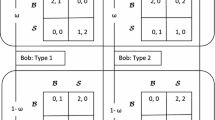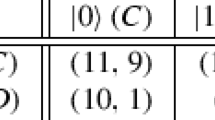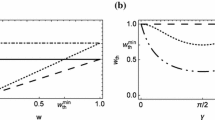Abstract
We use one of the influential quantum game models, the Marinatto–Weber model, to investigate quantum Bayesian game. We show that in a quantum Bayesian game which has more than one Nash equilibrium, one equilibrium stands out as the compelling solution, whereas two Nash equilibria seem equally compelling in the classical Bayesian game.
Similar content being viewed by others
Notes
There exist two mixed strategy Nash equilibria in this game, but their payoffs are smaller than \((B',B',B',B')\)’s and \((S',S',S',S')\)’s (see “Appendix” for the payoffs), thus rational players would not prefer mixed strategy Nash equilibria.
Any mixed strategy Nash equilibrium’s payoff is smaller than \((1,1,1,1)\)’s payoff because \((1,1,1,1)\) has the highest payoff among the pure strategy profiles (see “Appendix” for the payoffs), thus rational players would not prefer mixed strategy Nash equilibria.
There exists one mixed strategy Nash equilibrium in this game, but its payoffs are smaller than \((B',B',B')\)’s (see “Appendix” for the payoffs), thus rational players would not prefer the mixed strategy Nash equilibrium.
Any mixed strategy Nash equilibrium’s payoff is smaller than \((1,1,1)\)’s payoff because \((1,1,1)\) has the highest payoff among the pure strategy profiles (see “Appendix” for the payoffs), thus rational players would not prefer mixed strategy Nash equilibria.
References
Myerson, R.B.: Game Theory: Analysis of Conflict. Havard University Press, Boston (1991)
Meyer, D.A.: Quantum strategies. Phys. Rev. Lett. 82, 1052 (1999)
Eisert, J., Wilkens, M., Lewsenstein, M.: Quantum games and quantum strategies. Phys. Rev. Lett. 83, 3077 (1999)
Du, J.F., Li, H., Xu, X.D., Shi, M.J., Wu, J.H., Zhou, X.Y., Han, R.D.: Experimental realization of quantum games on a quantum computer. Phys. Rev. Lett. 88, 137902 (2002)
Guo, H., Zhang, J.H., Koehler, G.J.: A survey of quantum games. Decis. Support Syst. 46, 318 (2008)
Iqbal, A., Toor, A.H.: Quantum cooperative games. Phys. Lett. A 293, 103 (2002)
Nawaz, A., Toor, A.H.: Dilemma and quantum battle of sexes. J. Phys. A Math. Gen. 37, 4437 (2004)
Fra̧ckiewicz, P.: The ultimate solution to the quantum battle of the sexes game. J. Phys. A Math. Theor. 42, 365305 (2009)
Pykacz, J., Fra̧ckiewicz, P.: Arbiter as the third man in classical and quantum games. Int. J. Theor. Phys. 49, 3243 (2010)
Fra̧ckiewicz, P.: Quantum information approach to normal representation of extensive games. Int. J. Quant. Inf. 10, 1250048 (2012)
Iqbal, A., Toor, A.H.: Quantum repeated games. Phys. Lett. A 300, 541 (2002)
Fra̧ckiewicz, P.: Quantum repeated games revisited. J. Phys. A Math. Theor. 45, 085307 (2012)
Iqbal, A., Toor, A.H.: Quantum mechanics gives stability to a Nash equilibrium. Phys. Rev. A 65, 022306 (2002)
Nawaz, A., Toor, A.H.: Evolutionarily stable strategies in quantum Hawk–Dove game. Chin. Phys. Lett. 27, 050303 (2010)
Yu, T., Ben-Av, R.: Evolutionarily stable sets in quantum penny flip games. Quant. Inf. Process. 12, 2143 (2013)
Iqbal, A., Toor, A.H.: Backwards-induction outcome in a quantum game. Phys. Rev. A 65, 052328 (2002)
Chen, K.-Y., Hogg, T., Beausoleil, R.: A quantum treatment of public goods economics. Quant. Inf. Process. 1, 449 (2002)
Sekiguchi, Y., Sakahara, K., Sato, T.: Existence of equilibria in quantum Bertrand–Edgeworth duopoly game. Quant. Inf. Process. 11, 1371 (2012)
Nawaz, A., Toor, A.H.: Quantum games with correlated noise. J. Phys. A Math. Gen. 39, 9321 (2006)
Khan, S., Ramzan, M., Khan, M.: Quantum Stackelberg duopoly in the presence of correlated noise. J. Phys. A Math. Theor. 43, 375301 (2010)
Nawaz, A.: Prisoners’ dilemma in the presence of collective dephasing. J. Phys. A Math. Theor. 45, 195304 (2012)
Gawron, P., Kurzyk, D., Pawela, L.: Decoherence effects in the quantum qubit flip game using Markovian approximation. Quant. Inf. Process. 13, 665 (2014)
Chen, K.-Y., Hogg, T.: How well do people play a quantum prisoner’s dilemma? Quant. Inf. Process. 5, 43 (2006)
Chen, K.-Y., Hogg, T.: Experiments with probabilistic quantum auctions. Quant. Inf. Process. 7, 139 (2008)
Du, J.F., Li, H., Ju, C.Y.: Quantum games of asymmetric information. Phys. Rev. E 68, 016124 (2003)
Chen, X., Qin, G., Zhou, X.Y., Du, J.F.: Quantum games of continuous distributed incomplete information. Chin. Phys. Lett. 22, 1033 (2005)
Lo, C.F., Kiang, D.: Quantum Stackelberg duopoly with incomplete information. Phys. Lett. A 346, 65 (2005)
Qin, G., Chen, X., Sun, M., Du, J.F.: Quantum Bertrand duopoly of incomplete information. J. Phys. A Math. Gen. 38, 4247 (2005)
Li, H., Du, J.F., Massar, S.: Continuous-variable quantum games. Phys. Lett. A 306, 73 (2002)
Marinatto, L., Weber, T.: A quantum approach to static games of complete information. Phys. Lett. A 272, 291 (2000)
Osborne, M.J., Rubinstein, A.: A Course in Game Theory. MIT Press, Cambridge (1994)
Benjamin, S.C.: Comment on “A quantum approach to static games of complete information”. Phys. Lett. A 277, 180 (2000)
Eisert, J., Wilkens, M.: Quantum games. J. Mod. Opt. 47, 2543 (2000)
Marinatto, L., Weber, T.: Reply to “Comment on: A quantum approach to static games of complete information”. Phys. Lett. A 277, 183 (2000)
Nawaz, A., Toor, A.H.: Generalized quantization scheme for two-person non-zero sum games. J. Phys. A Math. Gen. 37, 11457 (2004)
Fra̧ckiewicz, P.: A new model for quantum games based on the Marinatto–Weber approach. J. Phys. A Math. Theor. 46, 275301 (2013)
Fra̧ckiewicz, P.: A comment on the generalization of the Marinatto–Weber quantum game scheme. Acta Phys. Polon. B 44, 29 (2013)
Cheon, T., Iqbal, A.: Bayesian Nash equilibria and Bell inequalities. J. Phys. Soc. Jpn. 77, 024801 (2008)
Brunner, N., Linden, N.: Connection between Bell nonlocality and Bayesian game theory. Nat. Commun. 4, 2057 (2013)
Iqbal, A., Chappell, J.M., Li, Q., Abbott, D.: A probabilistic approach to the quantum Bayesian games of incomplete information. Quant. Inf. Process. 13, 2783 (2014)
Acknowledgments
We are very grateful to Professor Weinstein, Editor-in-Chief, and the anonymous reviewers for their invaluable comments and detailed suggestions that helped to improve the quality of this paper. This work is supported by the Natural Science Foundation of Guangdong Province of China (Grant Nos. 2014A030310265, 2014A030313157) and the National Natural Science Foundation of China (Grant No. 61472452).
Author information
Authors and Affiliations
Corresponding author
Appendix
Appendix
The appendix contains four tables. Table 1 lists the pure and mixed strategy Nash equilibria in the classical Bayesian game with symmetric information, which appears in Sect. 2. Table 2 lists the payoffs of the pure strategy profiles in the quantum Bayesian game with symmetric information, which appears in Sect. 4. Table 3 lists the pure and mixed strategy Nash equilibria in the classical Bayesian game with asymmetric information, which appears in Sect. 5. Table 4 lists the payoffs of the pure strategy profiles in the quantum Bayesian game with asymmetric information, which appears in Sect. 5.
Rights and permissions
About this article
Cite this article
Situ, H. Quantum Bayesian game with symmetric and asymmetric information. Quantum Inf Process 14, 1827–1840 (2015). https://doi.org/10.1007/s11128-015-0984-2
Received:
Accepted:
Published:
Issue Date:
DOI: https://doi.org/10.1007/s11128-015-0984-2




